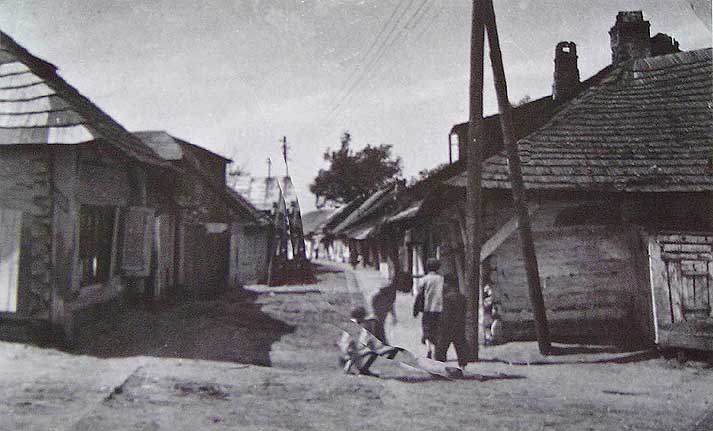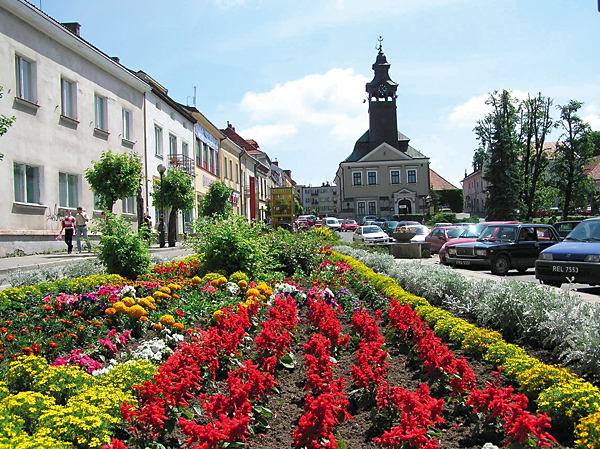In a few weeks if all goes according to plan and, in my
grandmother's words, mechishem (God willing),my husband and I
will be in southeast Poland, walking around the town, Przeworsk, that she and
her sister left in 1921. My own private
little March of the Living, without the marching. More like a pilgrimage, perhaps. Or, more narcissistically, the closing of a
great mythic, cinematic circle. As if the
last three generations made up an epic saga that I get to conclude.
Practically speaking, I doubt I could possibly meet anyone there who would
remember her family. They left for Rava Ruska, a town further east and now in
Ukraine, a few months or years before being gassed in Belzec and shot in
Kolomay, according to Yad VaShem documents.
So their presence in Przeworsk -- pronounced "Pshevorsk" -- could
have lasted until 1941 at the very latest.
Using the address listed on her brother's entry on his immigrant
ship's manifest, some years after she arrived, the Jewish street her family lived on has
been completely transformed, from low-slung, rough-hewn wooden houses to neat,
stuccoed, three-story apartment buildings.
And from early-20th-century Jews to contemporary Poles.
 |
| Przeworsk town hall, old market square |
Who will even notice this return? You readers, I'm hoping. I imagine we'll simply be pedestrians in this town, one big
enough for residents to not know each other.
Not big enough for tourism. I'll walk amid schools, parks, pharmacies,
beauty salons, shoe stores, insurance agencies, churches. The churches and a
few elegant buildings around the old market square may be the only things there
my grandmother might have seen, back before 1921.
Or perhaps Jewish American roots-travelers are a familiar
sight in the more distant precincts of Galicia by now -- even as far from
Krakow as Przeworsk. Przeworsk has no
surviving synagogue buildings, only pictures.
Przemysl, a bigger town further east, has two. Przeworsk does have a historical museum, the
web tells me, with perhaps a case of Jewish ritual artifacts, some photos and
some facts.
Google's 360-degree Street View camera has made it to
Przeworsk. I've already virtually strolled
around. Although their faces are blurred, the townspeople look perfectly
ordinary, if consistently white. Kids
with backpacks. Mothers with strollers. I can copy the words on the store signs
and paste them into Google Translate and poof, they turn into English. Shoe
store. Appliance shop.
 |
| Jewish street in Przeworsk before 1944 |
I can also search Google News for "Przeworsk" and
"Zydowski," to see if the town has generated any news of Jewish
interest in recent years. And I can
click to instantly translate whatever news items turn up. What shows up only serves to show how
thoroughly all traces of Jewish habitation have been erased. What shows up is
an article about Hebrew writing that was found on the back of a child's
gravestone. Turns out the unfortunate
child's name had been engraved on a rare, recycled headstone that hadn't been
plowed under with the rest of the Jewish cemetery. Such a rare artifact that today's
Przeworskers found its finding newsworthy.
Przeworsk's Jewish cemetery lies buried in the middle of
town, right along the main road, under the bus station. This fact is marked in Polish on a small,
unobtrusive stone monument sitting on an out-of-the-way grassy corner. When Google came by, one day in 2012, there
were some flowers and a candle at its foot. They could have come from a
sensitive Pole. But perhaps not. I know
I'm not the first returnee. Others have left pictures of their visits online.
